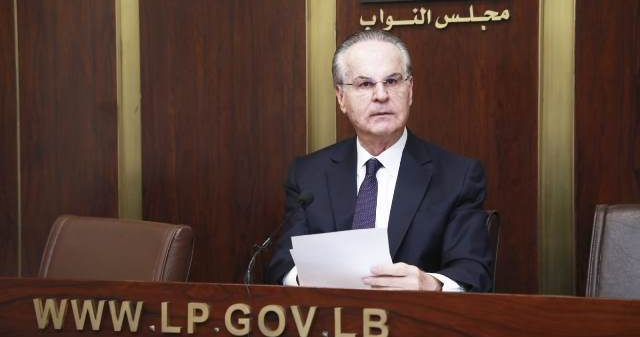
MP George Adwan. (Credit: NNA)
BEIRUT — Lebanon's head of the Justice and Administration Committee said on Tuesday that the current laws are sufficient in supporting a government crack-down on the Syrian population in Lebanon, whether refugees or migrants, and called for the deportation of Syrians residing illegally in Lebanon.
According to a National News Agency report, Lebanese Forces MP George Adwan said that the committee he leads has been studying draft and current laws related to Syrians in Lebanon, as well as international agreements, and it found that they are applicable "regarding the presence of Syrian refugees."
During a press conference held at Lebanese Parliament, Adwan said the committee had come to three main conclusions: The first, that "there are no Syrian refugees in Lebanon, because Lebanon is a transit country," the second that Syrians in Lebanon must abide by Lebanese laws, and the third, that any deviation from a 2003 UNHCR framework regarding asylum-seekers is a "violation of laws and the Constitution."
According to Human Rights Watch, the 2003 Memorandum of Understanding (MOU) between Lebanon's General Security and the United Nations High Commissioner for Refugees (UNHCR) is built on the assumption that Lebanon is not a country of permanent refuge and that UNHCR must resettle refugees elsewhere. The MOU provides for General Security to issue "circulation permits" to asylum-seekers and refugees for a maximum period of 12 months, during which time UNHCR works toward resettling to third countries the people it recognizes as refugees. Asylum-seekers and refugees who hold circulation permits are exempt from arrest and detention for being in the country illegally.
In Lebanon, General Security is the body responsible for the delivery of temporary visas at the borders and residency permits,
Lebanese Forces MP Ghada Ayoub told L'Orient Today that in accordance with the agreement, Lebanon has the authority to send back illegal Syrians and that those registered with UNHCR should either be hosted by a third country or should be sent back to Syria.
"If the government and General Security implement the signed agreement and apply the Lebanese law for the residence of foreigners, we do not need any additional law," Adwan added, calling for the deportation to Syria of all Syrians who don't have a valid residency permit.
Caretaker Prime Minister Najib Mikati has also advocated lately for the expulsion of illegal Syrian migrants.
Lebanon is not a party to the 1951 Convention relating to the Status of Refugees or to its 1967 Protocol. There is no legislation in Lebanon recognizing the specific situation of refugees.
According to official figures from the Office of the UNHCR, there are 1.5 million Syrians in Lebanon, of whom 779,645 are registered with the organization. In 2015, the Lebanese government suspended the registration of Syrian refugees with UNHCR.
Adwan specifically referred to Cabinet and the Ministry of Interior as being capable of using current laws to "fulfill [their] duties in the Syrian file."
"The issue of Syrian refugees is one of the most important issues that we are facing because it messes with our identity and entity and has negative repercussions on the economy and the livelihoods of the Lebanese," he said, echoing common rhetoric from Lebanese politicians who frequently blame the Syrian population in Lebaon, often without supporting evidence, for contributing to the various crises that have plagued the country in recent years.
"The Syrian presence in Lebanon is not legal, and nobody, including UNHCR, should classify it otherwise, and whoever has a proposal, let them host the Syrians in their country and implement the proposals they want," Adwan said. "The countries that lecture us should stop because they are only trying to serve their own interests," he added.
Parliament will convene next Wednesday, May 15, to discuss the financial package of $1 billion granted by the EU to support Lebanon's faltering economy and its security forces, as well as the impact of this aid on the administration of the Syrian population in Lebanon.
EU chief Ursula von der Leyen announced $1 billion in aid during a visit to Lebanon last week and urged the country's authorities to tackle illegal migration to the bloc.
Since its announcement on Thursday, a large part of the Lebanese political class denounced the aid package as an attempt to “bribe” the Lebanese into accepting the continued presence of Syrian migrants on its territory.